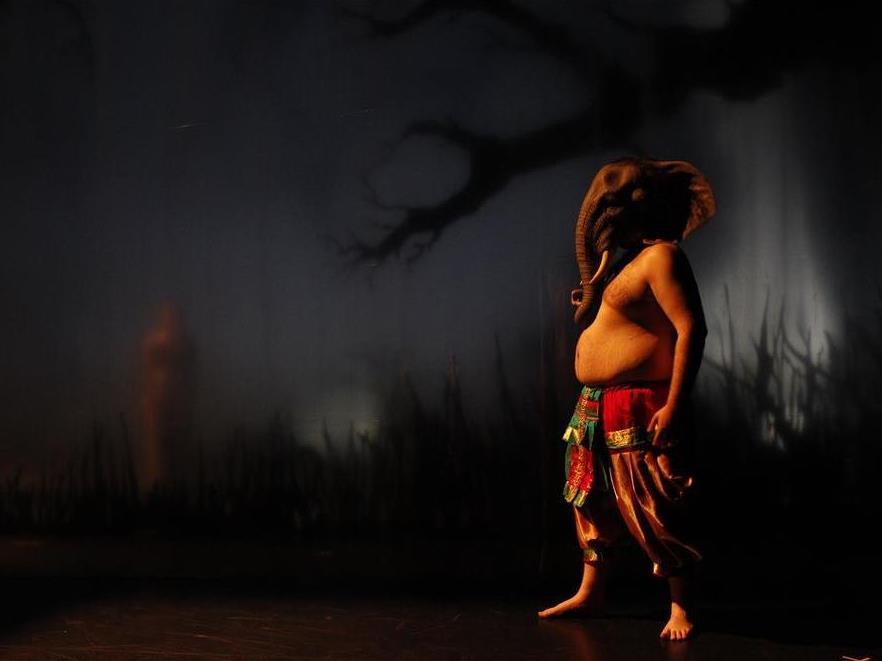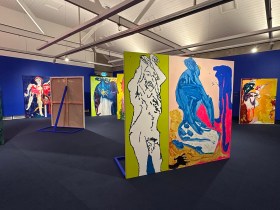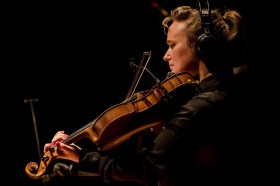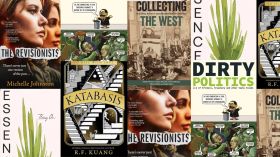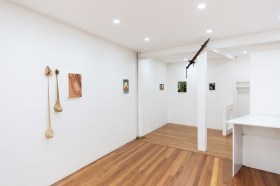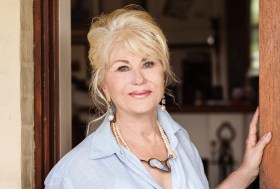A scene from Back to Back Theatre’s Ganesh Versus the Third Reich. Photogaph by Jeff Busby.
WHY THEATRE?
I work in the theatre because I believe that great art, made with time, care, attention, empathy, skill, intelligence, warmth, courage, rigor and a careful measure of audacity can really matter. I believe that great art makes a difference to civil society, that it opens our hearts and imaginations to a reality that could be less inequitable, less selfish, less brutal. That it allows us to imagine the seeming impossible.
ARTISTS WITH DISABILITIES
Back to Back Theatre is a company that first and foremost ruthlessly pursues rigorous creative investigation. Our principle mission is the creation of high quality contemporary art. That said, we often write that Back to Back Theatre is driven by an ensemble of actors with intellectual disabilities. This is a statement of our identity but not an expression of our collective interest or pursuit. And the actors of our company do not agree on how they wish to be collectively described. As one recently poignantly said: ‘I am ok with saying that I have a disability as long as I don’t have to talk about it.’
Since our focus is great art and since there is ambiguity about how the company is defined, I am sometimes reluctant to explicitly articulate that the company has an interest in disability rights. But I will say a few things on this topic, due to the current national rollout of the National Disability Insurance Scheme, which can and should provide opportunities for so many people with disabilities in Australia.
Without making gross generalisations of people with disabilities and what they can accomplish, it is safe to say that within Australian society, people with disabilities continue to be placed within the category of ‘the other’. Back to Back comments on the value-based structures that define the institution known as ‘the majority’. Family, career, sex, politics, religion, education and culture are all subject to a lateral analysis from an artistic team whose defining characteristic is separation from the spectacle of their subject matter.
As one of a relatively small number of professional arts organisations to employ artists with disabilities, we are sensitive to the lack of genuine employment opportunity that exists for such artists. Employment is an equaliser that authenticates and validates. It thrusts our artists into a playing field that values their insights and endeavour as being meaningful and real. Touring work supports ongoing employment by increasing organisational viability, but more importantly, it places that employment in a very public arena. The symbolic nature of such a strategy has resonance far beyond the citadel of the company.
ART, AMBITION & ENTREPRENEURSHIP
But there are also a few things about Back to Back Theatre, and my role in assisting to produce the company over the last 17 years, that I think are worth mentioning in a conversation about business and creativity.
Back to Back Theatre is a highly dynamic business enterprise. Yes, it’s a not-for-profit charitable organisation, and it’s a hard-hitting social enterprise with long-term cultural and economic impact.
But it’s a business and here are a few things that we have done, and that I have personally done, to build its product, brand, market, and reach.
1. We’ve identified the ingredients that we need to make great work, that our key assets are people, time and space.
Support the artists
My role as an arts producer is never to say ‘no’ to the artistic team. In a public forum a few years ago, I threw this idea to a group of arts managers and a large number were interested, but not one of them agreed with me unequivocally. I was surprised, they all said: ‘yes, but…’ I’m not really a ‘yes but…’ theatre producer: I am up for enormous creative risk and fierce ambition with a serious budget and plan behind it all. I have to listen, ask questions, bring my own insights to the table and then strive to make the seemingly impossible happen.
We have six actors with intellectual disabilities whom we view not as talents to be nurtured but as fully loaded guns with serious skills. We place a high value on the intimacy between these actors and the greater artistic team. And these actors and all who work for the company are deeply committed, for the long haul – across days and weeks and years and even decades – striving to make a genuine, contribution to the Western theatrical canon.
Time
We invest in research and development, in R & D that is, and take a serious amount of time to make the work. Thus in between national and international tours, regional community residences, workshops, advocacy and the real business of making a company function, on average we make one work every three years.
And then – and this is a rather rare for non-commercial theatre in Australia – we seek to keep the work in repertoire – touring in the market place – for 10 years. We expect the return on investment to be longitudinal. Ganesh Versus the Third Reich premiered in 2011 and next year will appear for the ninth year. (Our work Small Metal Objects – which is the first theatre work I ever fully produced – premiered in 2005, so is now in its 13th year of touring this year.)
Space
We have an amazing studio, an experimental laboratory – as we call it – for theatre making. It’s sometimes a place for presenting our work, but first and foremost, it’s a place for unfettered and ruthless creative investigation, for creative freedom. It is an essential constant, both a comforting home and a high performance functional environment.
2. We’ve created a unique product
Our shows are unique. We are aiming to make theatre that is unlike anything that an audience has seen before, that is totally unexpected, from us, or from anyone else in the world.
3. We’ve identified our market
In any given city in the world – in Geelong, or Mildura or Sydney or New York or Seoul – the market for our work is highly specific. It’s a small piece of the action in each city but when we add it up globally, it’s a massive, clear, engaged, artistically and socially committed audience.
Across time, I have personally worked to identify this audience and have been incredibly pro-active in doing so. I have done my homework and then cold called presenters from New York to Tokyo, literally landing on doorsteps across the world, with clarity of vision and a desire to collaborate.
This is the part of the business in which I have truly come into my own: I speak three languages, have lived in six different countries and believe that national borders are not important, that local ingenuity and international exchange, cooperation and dialogue are essential to our collective health and well being. I believe that art of calibre can and should be witnessed by audiences, as it can change what a person thinks is possible, for themselves, for others, for us all.
4. We’ve been entrepreneurial
At the beginning of my producing career, I never would have thought of myself as a businesswoman. There’s been a liberating freedom in this, as I had no expectations about what I could and could not do, but also demanded that I learn, on the ground and in cold, hard, fast real time, how to make it all add up, literally and metaphorically. It’s demanded grit, determination, systems, and spreadsheets and quite a few late nights across the years, but it’s been energising imagining a possibility and then bringing it into being.
And when I say entrepreneurial, I should also remark that Back to Back Theatre – like any strong business – has a highly diversified income base, with an unusually high percentage of earned income for a medium sized not-for-profit arts organisation.
5. We continue to have wild ideas
17 years on, we continue to take risks.
This year, we are performing a version of one of our shows in November in a bilingual version in Hong Kong as a precursor to striving to enter the Chinese market, where we hope to make a fully Chinese version of this show. This is a crazy idea I had – that a show about the triumph of friendship over economic gain performed by Chinese artists with and without disabilities – could be a great nexus for exploration in mainland China. But it’s not an easy or an obvious idea.
This year, to extend our impact and reach to audiences, we made our first major screen project, a TV show called Oddlands. This was a great challenge, a partnership with Matchbox Pictures, and a marvellously steep but exciting learning curve for me, as a theatre producer, to work out how TV is financed, delivered, marketed and sold.
Oddlands will have its world premiere screening at the Adelaide Film Festival in a few weeks, screen on ABC TV early in 2018 and then, once I sink my teeth into how to finance and distribute an international screen production, we hope to serialise it, for a year, or maybe for years to come. One has to dream big.
6. We’ve still got lots to learn
We like to think we are quite smart, but we still make mistakes. But when do, we take responsibility.
In the [2011] controversy surrounding the world premiere of Ganesh Versus the Third Reich, it took my full attention and great care to respond to the media, to personally answer more than 1,000 emails from around the world, to connect with the Indian High Commissions in Australia, to work alongside the Office for Citizenship and Multicultural Affairs to bring a constructive dialogue into being, to support and shield our artists from the fray, and to assist our presenting partners and the investors in the work to collectively articulate a respectful and considered position to the public.
Again, it was not easy, but it was a privilege to seek to hold this space open for communication, and I am enormously lucky to have had this opportunity.
FROM SONIA
As it only right, I will close now with some thoughts from a member of the Back to Back Theatre ensemble, Sonia Teuben. Just the other day she wrote:
‘Theatre should be for the people. For the people to have a voice. And not feel afraid of that.
‘Theatre needs to come from listening to other people … True stories. In-ya-face kind of stories. Stories from the heart and the mind. Stories that are deep down inside of you. Stories that you never forget for a long time.’
Sonia wrote: ‘My taxi driver this morning, he was a single bloke, lives in a house. I asked him questions like ‘You got a wife?’ he said ‘No.’ I said ‘You got a dog?’ He said ‘No.’ I said ‘You got kids?’ He said ‘No.’ I said ‘What do you do in life?’ He says ‘I read books and I drive taxis.’ I said ‘That must be boring.’ He says ‘It’s not. That’s life.’ He said to me ‘Have a really nice day. You are a very special woman’. I said ‘You should really get a cattle dog, you seem lonely.’
Sonia then wrote ‘Theatre is for the rich. Theatre is for the poor. For the loneliness. [And f]or the forgiveness.’
Thank you.
This is an edited extract from a speech entitled Art & The Seeming Impossible given by Back to Back Theatre’s Executive Producer, Alice Nash, today at the Currency House Creativity and Business Breakfast at Sydney’s Museum of Contemporary Art.

